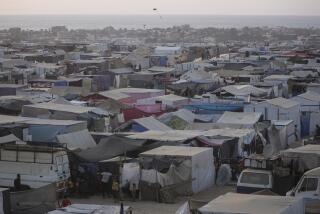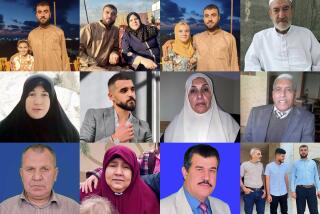Palestinians’ Mortar Fire May Signal a Deadlier Conflict
GAZA CITY — Palestinian fighters have added mortars to the arsenal they regularly use against Israel, drawing heavy retaliation and signaling a new phase in half a year of conflict.
In a rare interview, Palestinians who claim responsibility for firing mortar shells into Israel proper, as well as at Jewish settlements in the Gaza Strip, said they already have succeeded in one goal--unnerving the enemy. Next, they said, they will attempt to improve their aim to exact more casualties.
An Israeli government spokesman on Monday branded the firing of mortars at the Jewish state an act of hostility that marks a dangerous new level of warfare.
Gaza has seen a fierce escalation of fighting in recent days, with Palestinians firing mortars at Israeli targets and Israel retaliating with rockets, antitank missiles and mortars of its own. There has been minor damage on the Israeli side, while two Palestinian police stations, an office of Palestinian Authority President Yasser Arafat’s Fatah movement and a civilian home were destroyed over the weekend.
After months of using rocks, assault rifles, Molotov cocktails and the occasional suicide bomber in their fight to oust Israel from the West Bank and Gaza--and taking the brunt of casualties--Palestinians have increased both the range and the destructive potential of their firepower by using the mortars.
The use of such weapons also stands in sharp contrast to years of Israeli-Palestinian conflict, including the first intifada, which began in 1987 and in which Palestinians’ choice of arms was much more limited.
In early February, for the first time, Palestinians began lobbing mortar shells at the Jewish settlement of Netzarim in Gaza. On March 18, the first mortars were fired at Israel proper, hitting an army base near the Nahal Oz kibbutz. The kibbutz itself was hit April 3.
In all, there have been 56 mortar attacks since early February, according to a tally by the Israeli army. Sporadic at first, they are now occurring with regular intensity.
Another shell crashed Monday into the Atzmona Jewish settlement in Gaza, and three more late Monday at Netzarim. Most of the shells used so far have been relatively crude. Palestinians said that on Sunday, Israelis launched surface-to-surface missiles, another first in the spiral of violence.
No Israelis have been killed in the shelling, but three were injured, including a 1-year-old. The retaliatory rocketing by Israel, which has come swiftly since the government of Prime Minister Ariel Sharon took office last month, has injured scores of Palestinian police and civilians.
“We consider ourselves to be free to act against Israeli targets, without restraint, whether inside or outside of Gaza,” said the leader of a unit that has carried out mortar shelling. He uses the nom de guerre Abu Jamal and agreed to be interviewed on the condition that his identity and the location of the meeting not be revealed.
Abu Jamal said Palestinians began using mortars after the Israeli army razed orchards, demolished homes and otherwise denuded much of the Gaza landscape, making it difficult for gunmen to approach Israeli targets without being detected.
Mortars are not a very precise weapon because they are hard to aim; collateral damage is a big problem. But they do allow the attacker to keep a distance and move quickly, often before Israeli forces have time to react.
Most of a mortar shell’s lethal power comes from the shrapnel sprayed when it lands. Because shells can be fired high, to drop in a nearly vertical line, it is difficult to shield against them, especially in civilian areas. That adds to the great psychological damage that the weapon can do.
“The enemy will never be able to fully protect all of the settlements from mortars. This is its secret, its strength,” Abu Jamal said. “It’s true that it is not a very accurate weapon, but we don’t actually care that it’s not 100% accurate. Whether or not it hits the target, we want to create confusion and terror. We want the Israelis to think that their army cannot protect them.”
The interview with Abu Jamal--who wore camouflage fatigues, covered his face with a black ski mask and was armed with an American-made M-16--took place late Sunday in Gaza City. He was accompanied by two other combatants and insisted that the meeting be cloaked in secrecy, primarily because of his fears of an Israeli hit.
Israeli military officials attribute the introduction of mortar capability in large measure to Massoud Ayyad, a lieutenant colonel in Arafat’s Force 17 security force, who Israelis say headed a Gaza-based cell of the Lebanese militant group Hezbollah. Israel killed Ayyad as he drove down a Gaza road Feb. 13.
Abu Jamal, 36, said he belongs to the military wing of the Popular Front for the Liberation of Palestine, a small, radical group that opposed peace treaties with Israel, and to one of several of its cells believed to be operating with mortars.
He would not say where he obtained the 81- and 82-millimeter mortars that his team uses.
“These weapons have existed here for a long time, and now is the time to use them,” he said, adding that the Palestinians are attempting to lengthen the mortars’ range and improve their accuracy. An 81-millimeter has a range of about 2 1/2 miles.
Israeli military intelligence officials say mortar shells have probably been smuggled into Gaza through tunnels dug from Egypt or have been dropped in barrels into the sea to be picked up by boat off the Gaza coast, a method traditionally employed for drug trafficking. Israeli newspapers have also reported the existence of a factory in Gaza City that is purportedly used to build the tube launchers, and perhaps the shells.
Palestinians have been careful not to show the full scope of their arsenal. Israeli military intelligence officials say they believe the Palestinians have been stockpiling antiaircraft guns, antitank missiles and other far more deadly equipment. Under terms of the 1993 Oslo peace accords, Arafat’s police forces are allowed to have 15,000 guns and a set number of armored personnel carriers. Most other weaponry is illegal.
Palestinians argue that facing Israel, with the mightiest army in the region, they are still at a crippling disadvantage.
“They have gunships. They have tanks. How can we be seen as the aggressors?” said a captain with Force 17 who identified himself as Ashraf, as he showed a reporter the ruins of the elite guard’s Gaza headquarters, which has been bombarded twice by Israel. He did not want his last name used. Israel blames Force 17 for a string of deadly shootings and mortar attacks against Israelis.
At the Beit Lahiya police station, blasted into smithereens by Israeli rocket fire, Brig. Gen. Mahmoud Seidam stepped through the charred rubble of his office and bedroom and angrily asked why Israel would target a police force that, unlike Force 17, is lightly armed and handles traffic tickets, thefts and drug dealers.
“We are not the fighters,” he said.
Israel’s public security minister, Uzi Landau, indirectly answered the question Monday.
“The police there are former terrorists who are still terrorists, acting with the green light of Arafat,” Landau said during a meeting in Jerusalem with foreign reporters. “The so-called Palestinian police is a target we have to protect our people from.”
Israeli government officials said Israel from now on will retaliate “relentlessly” and without warning. Moshe Arens, a former defense minister and an advisor to Sharon, said: “They should know that we have means that we still haven’t used.”
In Nahal Oz, the kibbutz that has been on the receiving end of Palestinian mortars, residents Monday voiced both resignation and defiance.
“We are getting used to this unhealthy situation,” Gazit Hagivi told Israeli television. “But if I get a good chance to move out of here, I will.”
More to Read
Sign up for Essential California
The most important California stories and recommendations in your inbox every morning.
You may occasionally receive promotional content from the Los Angeles Times.











